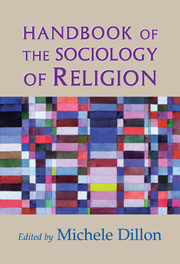Book contents
- Frontmatter
- Contents
- List of Contributors
- Acknowledgment
- Part One Religion as a Field of Sociological Knowledge
- Part Two Religion and Social Change
- Part Three Religion and the Life Course
- Part Four Religion and Social Identity
- 16 Religious Identities and Religious Institutions
- 17 Religion and the New Immigrants
- 18 A Journey of the “Straight Way” or the “Roundabout Path”
- 19 Beyond the Synagogue Walls
- 20 Dis/location
- Part Five Religion, Political Behavior, and Public Culture
- Part Six Religion and Socioeconomic Inequality
- References
- Index
20 - Dis/location
Engaging Feminist Inquiry in the Sociology of Religion
Published online by Cambridge University Press: 05 June 2012
- Frontmatter
- Contents
- List of Contributors
- Acknowledgment
- Part One Religion as a Field of Sociological Knowledge
- Part Two Religion and Social Change
- Part Three Religion and the Life Course
- Part Four Religion and Social Identity
- 16 Religious Identities and Religious Institutions
- 17 Religion and the New Immigrants
- 18 A Journey of the “Straight Way” or the “Roundabout Path”
- 19 Beyond the Synagogue Walls
- 20 Dis/location
- Part Five Religion, Political Behavior, and Public Culture
- Part Six Religion and Socioeconomic Inequality
- References
- Index
Summary
The impact of feminism and feminist scholarship on the field of sociology has been much debated. This essay extends that debate to the sociology of religion and spirituality. I argue that those women sociologists who identified with the women's movement experienced a dislocation when they tried to move between their experiences as women and their experiences in the world of sociology. This chapter emphasizes one response, the call for a sociology for women, a radical rethinking of how we know what we know and for whom we undertake this project of knowledge production. I begin with a short discussion of feminism both inside and outside of the academy, and then I review a broad range of studies that contribute to making women visible and explore questions of gender and religion. Next I outline a method of inquiry that comes out of the work of Dorothy Smith and Patricia Hill Collins. It is a feminist theory that begins with an alternative epistemology, and posits a feminist sociology that takes as its core assumption the idea that all knowledge is located and interested. I end with three works that exemplify located, feminist research.
DEBATES ABOUT/WITHIN FEMINISM
Sitting down at my wordprocessor, I ponder the task before me. The idea of writing an essay on “feminist theory and the sociology of religion” seems so much more problematic than it did even ten years ago when I agreed to take on a similar task.
- Type
- Chapter
- Information
- Handbook of the Sociology of Religion , pp. 276 - 294Publisher: Cambridge University PressPrint publication year: 2003
- 14
- Cited by

